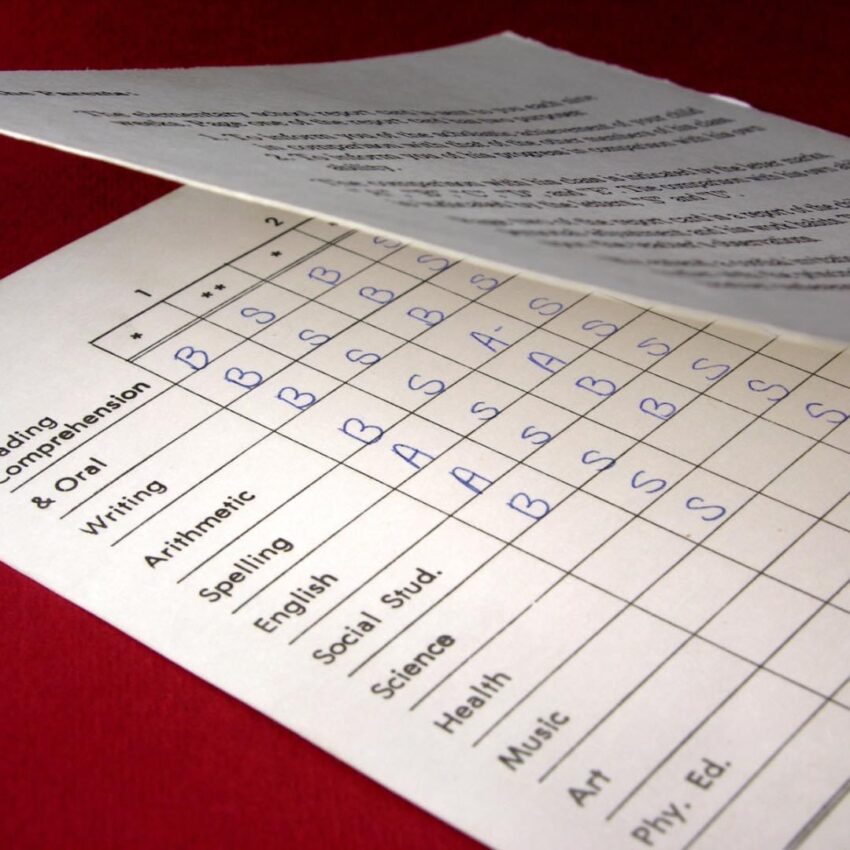I got in trouble twice that I remember in first grade. First, my teacher had her evaluation with the principal the same day my body decided to run fever in class. She had told us to be on our best behavior, so when my head started to hurt, I simply laid it down on my desk. When the principal left, I was asked to put my name on the board for not paying attention.
I was humiliated. I still vividly remember walking to the front of the class, picking up the piece of chalk, and writing my name on the “bad list”.
I strived to be perfect, and I dreaded having to go home and tell my parents I had gotten into trouble. Luckily, the fever trumped the transgression, and my parents didn’t punish me more. Quite the contrary. They let my teacher know what had happened, and when I was better, my teacher invited me over for milk and cookies at her home to rectify the situation. Ahh, those were the days! 🍪 + 🥛 = 😊
As a parent, I remember the first time my child came home from having to bear the weight of “clipping-down” in her classroom for talking too much. She told me right away. She was devastated.
As she has aged, the humiliation of having to clip down in front of her class has changed to having to “walk the road” during recess and suffering humiliation in front of the entire school. She regularly walks the road, and she comes home each time and tells me about it. Each time she feels humiliated, but I never get angry with her over it. She suffered the punishment at school. I just help her process it as we talk through what happened.
Sometimes I agree with her and say, “Life isn’t fair”, and you probably didn’t deserve the punishment. Just like the time I got in trouble for being sick, sometimes she gets in trouble and the teacher doesn’t know the full story.
Sometimes it’s the other way around. I often have to pull the layers off of my daughter’s story to get to the root of why she got in trouble. Seldom does she end up “walking the road” for talking once during the day. Usually, as I pry deeper, we discover together she had a lot of warnings to stop talking and pay attention before frustration led her teacher to assign the “walk of shame” as punishment.
I once had a discussion with a group of adults about the sin we hide in our lives. One of the adults volunteered how it took him days to share with his wife the full magnitude of his transgressions and in turn ask for forgiveness from her and from Christ. There were a lot of layers he had to unbury before it all came out.
The general consensus of those in the discussion was, “I can’t believe it took days. Why didn’t he just rip the bandaid off?”
But I have been there. Sometimes it’s not easy to just lay it all on the line. Sometimes we have to work through the layers.
For example, the second time I got in trouble in first grade was for changing the “F” I got in handwriting to an “A” on my handwritten report card. If you missed the irony in that, reread the class and what I did again.
Sometimes, it’s hard to just rip the bandaid off and let it all pour out because we don’t fully understand the magnitude of what we have done. We think we did well covering the sins that lay in full sight for everyone to see, and we don’t realize our sins are laying in plain sight, so we sin more trying to hide them.
I wish the worst sin (by human standards) in my life was still thinking I could hide my failing grade in handwriting by changing the letter. But my sins are many, and they’ve caused paths of great destruction from time-to-time.
Sometimes it’s been hard to just rip the bandaid off and spill the beans because I didn’t truly believe I would find forgiveness and grace. This was especially true in my early walk as a Christian. Testing the waters and finding acceptance allowed more to pour out of me. In doing so, I began to find healing and peace. Learning about and then trusting in God’s ability to resurrect and restore things also aided in my ability to be more authentic, open, and honest about the things I did (and continue to do) wrong.
Luke 11:34 (NIV) reminds us, “Your eye is the lamp of your body. When your eyes are healthy, your whole body also is full of light. But when they are unhealthy, your body also is full of darkness.”
Psalm 18:28 (NIV) reminds us, “You, Lord, keep my lamp burning; my God turns my darkness into light.”
Colossians 3:13 (NIV) reminds us, “Bear with each other and forgive one another if any of you has a grievance against someone. Forgive as the Lord forgave you.”
Most of us walk around with secrets we don’t want the world to know, but no matter how many layers we try to hide them under, God knows all. It may take you time to peel back the layers as you ask Him, and those around you, for forgiveness. That’s okay! Sometimes, the layer approach helps you process healing one step at a time.
So if there’s something you’re hiding, go grab yourself a cup of milk, a few cookies, and your Bible. Turn to Psalm 139:23-24 (NIV) and ask, “Search me, God, and know my heart; test me and know my anxious thoughts. See if there is any offensive way in me, and lead me in the way everlasting.” Then trust the Holy Spirit will guide you through the walk of seeking forgiveness that follows.

